语法1一般现在时练习(第一课)
初中英语语法一般现在时练习题及全部答案
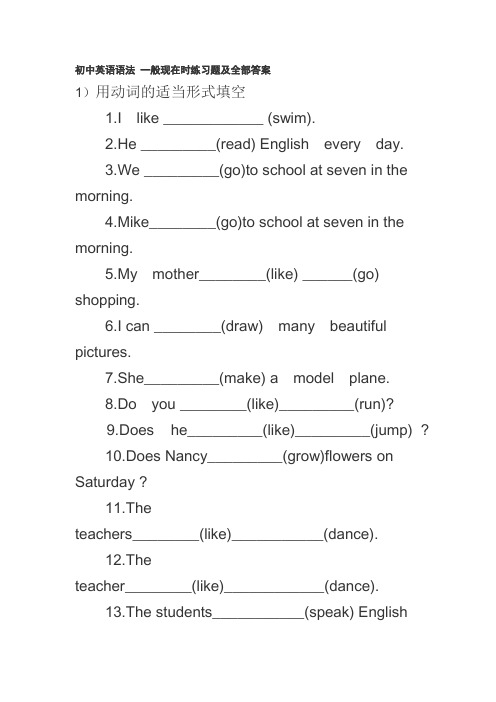
初中英语语法一般现在时练习题及全部答案1)用动词的适当形式填空1.I like ____________ (swim).2.He _________(read) English every day.3.We _________(go)to school at seven in the morning.4.Mike________(go)to school at seven in the morning.5.My mother________(like) ______(go) shopping.6.I can ________(draw) many beautiful pictures.7.She_________(make) a model plane.8.Do you ________(like)_________(run)?9.Does he_________(like)_________(jump) ?10.Does Nancy_________(grow)flowers on Saturday ?11.Theteachers________(like)___________(dance).12.Theteacher________(like)____________(dance).13.The students___________(speak) Englishin class.14.The student_________(speak) Chinese after class.15. Let's____________and play football . ( go )16. He_____________ like swimming . ( not )17. I'm sorry ____________that . ( hear )18. Wang Bing is____________ ( write ) anE-mail to his friend .19. He has_____________a headache . ( get )20. _________you study English at school ? Yes , I___________. ( do )21. __________your sister study English at school ? No , she__________ . ( do )22. I'm _________ better . ( feel )23. Why__________Tom absent today ? ( be )英语一般将来时的三要素[第一要素]一般将来时的概述:一般将来时表示将来某个时间要发生的动作或存在的状态,也可以表示将来经常或反复发生的动作。
一般现在时,现在进行时语法及练习

一般现在时一.定义:表示经常性的事情,经常性的动作或一般性事实。
二.标志性词语:often经常,usually通常,always总是,every每个,sometimes有时,at…在几点钟三.动词变化:第三人称单数用动词的“三单变化”,其他用动词的原形。
三单变化:情况构成方法读音例词一般情况加-s 清辅音后读/〃浊轴音和元首后读/z/swim-swims ;help-helps ;like-likes以辅音字母+o结尾的词加-es读/z/goes,does以s,sh,ch,x 等结尾的词加-es读/iz/watches,washes 以辅音字母+y结尾的词变y为i再加es读/z/study-studies 不规则变化have和be动词变have 为has变be 为am,is,arehave-has be-am,is,are四、一般现在时的句子转换:(1)当句子中有be动词或情态动词时:提:把be动词或情态动词(can,could等等)提到主语的前面;否定句:在be动词或情态动词后面加not例:①陈述句:She is a student.疑问句—Is she a student?否定句—She is not a student.②陈述句:I can swim.疑问句—Can you swim否定句—I can not swim.(2)当句子中即没有be动词,也没有情态动词时,则在主语前加助动词do (you,以及复数),does(单数she,he,it)变成问句;在主语后谓语动词前加助动词don’t (I,you,以及复数),doesn’t (单数she,he,it)变成否定句,助动词后的动词要变成动词原形。
例:①陈述句:We get up at 7:00 every morning.疑问句—Do you get up at 7:00 every morning?否定句—We don,t get up at 7:00 every morning.②陈述句:She has a little brother.疑问句—Does she have a little brother?否定句—She doesn,t have a little brother.总结:当主语是第三人称单数时:1、动词变相应的第三人称单数形式2、肯定句主语+动词s+其它3、否定句主语+doesn't+动词原形+其它4、一般疑问句Does+主语+动词原形+其它5、肯定回答Yes,主语+does6、否定回答No,主语+doesn't7、特殊疑问句特殊疑问词+一般疑问句当主语不是第三人称单数时:1、肯定句主语+动词原形+其它2、否定句主语+don't+动词原形+其它3、一般疑问句Do+主语+动词原形+其它4、要注意,句式结构错则全都错。
(完整版)一般现在时练习题及答案解析
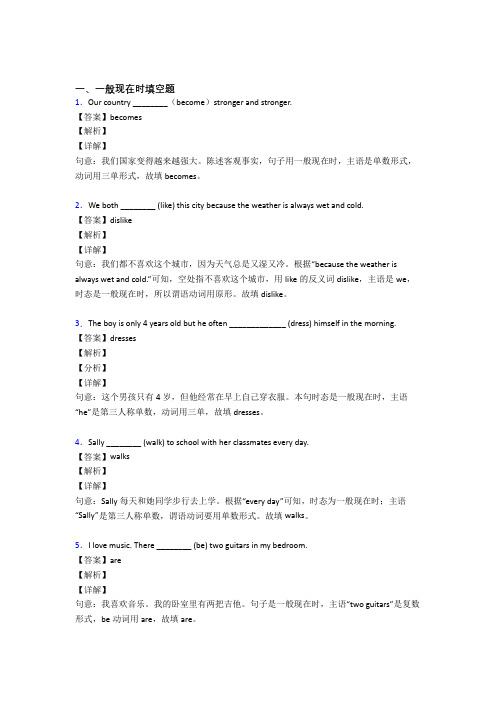
一、一般现在时填空题1.Our country ________(become)stronger and stronger.【答案】becomes【解析】【详解】句意:我们国家变得越来越强大。
陈述客观事实,句子用一般现在时,主语是单数形式,动词用三单形式,故填becomes。
2.We both ________ (like) this city because the weather is always wet and cold.【答案】dislike【解析】【详解】句意:我们都不喜欢这个城市,因为天气总是又湿又冷。
根据“because the weather is always wet and cold.”可知,空处指不喜欢这个城市,用like的反义词dislike,主语是we,时态是一般现在时,所以谓语动词用原形。
故填dislike。
3.The boy is only 4 years old but he often _____________ (dress) himself in the morning.【答案】dresses【解析】【分析】【详解】句意:这个男孩只有4岁,但他经常在早上自己穿衣服。
本句时态是一般现在时,主语“he”是第三人称单数,动词用三单,故填dresses。
4.Sally ________ (walk) to school with her classmates every day.【答案】walks【解析】【详解】句意:Sally每天和她同学步行去上学。
根据“every day”可知,时态为一般现在时;主语“Sally”是第三人称单数,谓语动词要用单数形式。
故填walks。
5.I love music. There ________ (be) two guitars in my bedroom.【答案】are【解析】【详解】句意:我喜欢音乐。
我的卧室里有两把吉他。
句子是一般现在时,主语“two guitars”是复数形式,be动词用are,故填are。
一般现在时练习题及答案
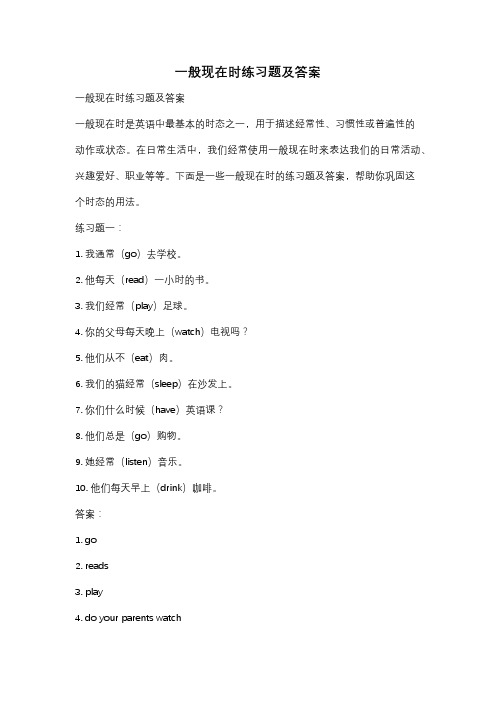
一般现在时练习题及答案一般现在时练习题及答案一般现在时是英语中最基本的时态之一,用于描述经常性、习惯性或普遍性的动作或状态。
在日常生活中,我们经常使用一般现在时来表达我们的日常活动、兴趣爱好、职业等等。
下面是一些一般现在时的练习题及答案,帮助你巩固这个时态的用法。
练习题一:1. 我通常(go)去学校。
2. 他每天(read)一小时的书。
3. 我们经常(play)足球。
4. 你的父母每天晚上(watch)电视吗?5. 他们从不(eat)肉。
6. 我们的猫经常(sleep)在沙发上。
7. 你们什么时候(have)英语课?8. 他们总是(go)购物。
9. 她经常(listen)音乐。
10. 他们每天早上(drink)咖啡。
答案:1. go2. reads3. play4. do your parents watch5. eat6. sleeps7. do you have8. go9. listens to10. do they drink练习题二:1. 你通常几点起床?2. 他们每周末去哪里?3. 你的朋友们喜欢什么运动?4. 你们的狗喜欢吃什么食物?5. 他们多久去一次健身房?6. 你们的邻居是干什么的?7. 你每天晚上做什么?8. 他们有多少个孩子?9. 你喜欢什么颜色?10. 他们通常什么时候吃晚饭?答案:1. What time do you usually get up?2. Where do they go on weekends?3. What sports do your friends like?4. What food does your dog like?5. How often do they go to the gym?6. What do your neighbors do?7. What do you do every evening?8. How many children do they have?9. What color do you like?10. When do they usually have dinner? 练习题三:1. 我们经常(go)购物。
英语一般现在时语法及练习题

英语一般现在时语法及练习题英语一般现在时语法及练习题在日常学习和工作中,我们很多时候都会有考试,接触到练习题,做习题在我们的学习中占有非常重要的位置,对掌握知识、培养能力和检验学习的效果都是非常必要的,你所见过的习题是什么样的呢?下面是店铺为大家整理的英语一般现在时语法及练习题,仅供参考,大家一起来看看吧。
英语一般现在时语法及练习题1现在一般时(present tense)概念:表示通常性、规律性、习惯性、真理性的状态或者动作(有时间规律发生的事件)的一种时间状态。
常用结构:1.主语+谓语+其他(表动作)It never snows in Australia in December.澳大利亚的12月里从来不下雪。
They usually go to school by bike.他们通常骑自行车上学。
He writes to his father twice a month.他每月写两次信给他爸爸。
2.主语+be+表语(表状态)He is a student.他是学生。
ⅠBe动词的一般现在时主语+be(am , is , are)+其它肯定句式:主语+be( am, is, are)+其它. 如,The color is blue.否定句式:主语+be(am, is, are) +not +其它.如,The color is not blue.一般疑问句:Be(am, is, are) +主语+其它?.注:在这种构成中,be动词有人称和数的变化,即要根据主语选用am / is / are。
Be动词分为单数和复数,am和is是表示单数,am只跟I搭配(除了I其余的单数都用is),are表示复数。
Ⅱ 实义动词的.一般现在时① 主语(第三人称单数)+动词(第三人称单数形式)+其它肯定句式:主语(第三人称单数)+动词(第三人称单数形式)+其它,如,He likes it否定句式:主语(第三人称单数)+doesn’t+动词(原形)+其它.如:He dosen't like it.一般疑问句:Does+主语(第三人称单数)+动词(原形)+其它? Does he like it?② 主语(除了第三人称单数)+动词(原形)+其它肯定句式:主语(除了第三人称单数)+动词(原形)+其它如:I like it 否定句式:主语(除了第三人称单数)+don’t+动词(原形)+其它.如:I don't like it.一般疑问句:Do+主语(除了第三人称单数)+动词(原形)+其它? Do you know it.注:do、don’t和does、doesn’t是构成一般现在时的助动词,其特点是要在其后跟动词的原形。
小学英语一般现在时用法及习题(含答案)

精心整理一般现在时基本用法介绍【No.1】一般现在时的功能1.表示事物或人物的特征、状态。
如:Theskyisblue.天空是蓝色的。
2.表示经常性或习惯性的动作。
如:Igetupatsixeveryday.我每天六点起床。
3.表示客观现实。
如:Theearthgoesaroundthesun.地球绕着太阳转。
一般现在时的构成1.be动词:主语+be(am,is,are)+其它。
如:Iamaboy.我是一个男孩。
2.行为动词:主语+行为动词(+其它)。
如:WestudyEnglish.我们学习英语。
当主语为第三人称单数(he,she,it)时,要在动词后加"-s"或"-es"。
如:MarylikesChinese.玛丽喜欢汉语。
【No.2】一般现在时的变化1.be动词的变化。
否定句:主语+be+not+其它。
如:Heisnotaworker.他不是工人。
一般疑问句:Be+主语+其它。
如:-Areyouastudent?-Yes.Iam./No,I'mnot.特殊疑问句:疑问词+一般疑问句。
如:Whereismybike? 2.行为动词的变化。
否定句:主语+don't(doesn't)+动词原形(+其它)。
如:Idon'tlikebread.当主语为第三人称单数时,要用doesn't构成否定句。
如:Hedoesn'toftenplay.一般疑问句:Do(Does)+主语+动词原形+其它。
如:-Doyouoftenplayfootball?-Yes,Ido./No,Idon't.当主语为第三人称单数时,要用does构成一般疑问句。
如:-Doesshegotoworkbybike?-Yes,shedoes./No,shedoesn't.【No.3】特殊疑问句:疑问词+一般疑问句。
如:Howdoesyourfathergotowork?动词+s的变化规则1.一般情况下,直接加-s,如:cook-cooks,milk-milks2.以s.x.sh.ch.o结尾,加-es,如:guess-guesses,wash-washes,watch-watches,go-goes3.以“辅音字母+y”结尾,变y为i,再加-es,如:study-studies一般现在时用法专练:一、写出下列动词的第三人称单数二、drink________go_______stay________make________三、look_________have_______pass_______carry____四、come________watch______plant_______fly________五、study_______brush________do_________teach_______二、用括号内动词的适当形式填空。
一般现在时(1)
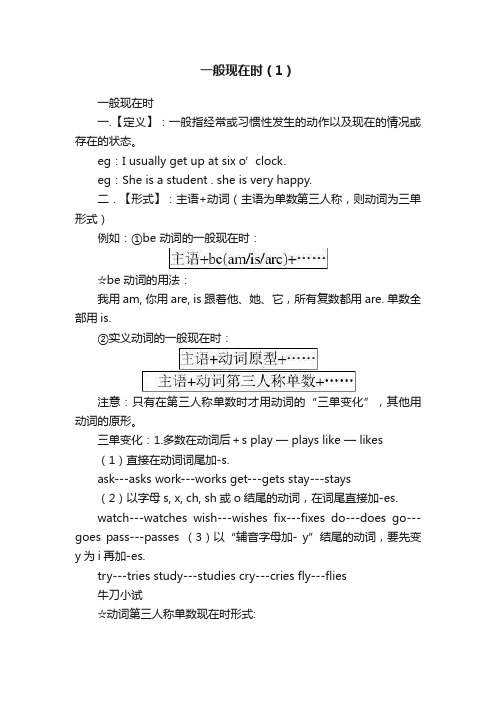
一般现在时(1)一般现在时一.【定义】:一般指经常或习惯性发生的动作以及现在的情况或存在的状态。
eg:I usually get up at six o’clock.eg:She is a student . she is very happy.二.【形式】:主语+动词(主语为单数第三人称,则动词为三单形式)例如:①be 动词的一般现在时:☆be 动词的用法:我用am, 你用are, is跟着他、她、它,所有复数都用are. 单数全部用is.②实义动词的一般现在时:注意:只有在第三人称单数时才用动词的“三单变化”,其他用动词的原形。
三单变化:1.多数在动词后+s play — plays like — likes(1)直接在动词词尾加-s.ask---asks work---works get---gets stay---stays(2)以字母s, x, ch, sh或o结尾的动词,在词尾直接加-es.watch---watches wish---wishes fix---fixes do---does go---goes pass---passes (3)以“辅音字母加- y”结尾的动词,要先变y为i再加-es.try---tries study---studies cry---cries fly---flies牛刀小试☆动词第三人称单数现在时形式:go __________ have __________ do ___________fly __________ play __________ get___________watch_________ study_________ run___________三.【时间标志词】:①often、always、usually、sometimes、once a week 、everyday等表示频度的副词。
②on Saturday 、everyday、in the morning、等时间状语。
一般现在时(语法+习题)
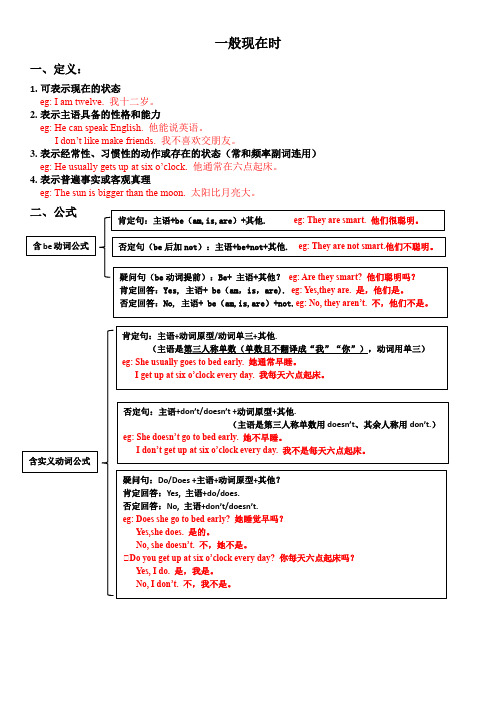
一般现在时一、定义:1.可表示现在的状态eg: I am twelve. 我十二岁。
2.表示主语具备的性格和能力eg: He can speak English. 他能说英语。
I don’t like make friends. 我不喜欢交朋友。
3.表示经常性、习惯性的动作或存在的状态(常和频率副词连用)eg: He usually gets up at six o’clock. 他通常在六点起床。
4.表示普遍事实或客观真理eg: The sun is bigger than the moon. 太阳比月亮大。
二、公式三、动词变第三人称单数的规则1.直接加s(读音:清辅音后读[s],元音和浊辅音后读[z])eg: help-helps come-comes2.以s,x,sh,ch,o结尾,加es(读音:es读[ɪz],goes和does除外)eg: watch-watches wash-washes do-does miss-misses3.以辅音加y结尾,把y变i加es(读音:es读[z])eg: try-tries study-studies4.特殊:have-has四、练习巩固:写出下列动词的单三形式go__________ catch_________ brush(刷)_____ teach_______do________ like________ have___________ watch________ drink ___________ fly___________ say_______ learn ___________ eat___________ read___________ sing___________ buy__________ study_______ stay __________ make __________ look ______ pass__________ carry ____ come__________ plant(种植)______用单词正确形式填空。
一般现在时和现在进行时时态练习及讲解
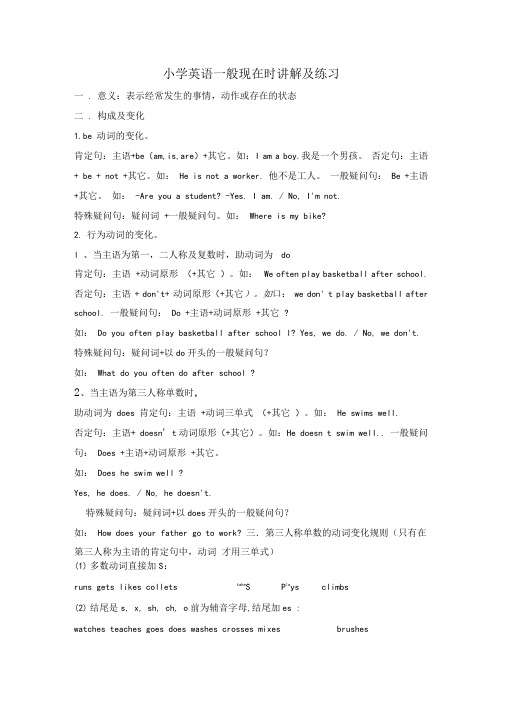
小学英语一般现在时讲解及练习一. 意义:表示经常发生的事情,动作或存在的状态二. 构成及变化1.be 动词的变化。
肯定句:主语+be(am,is,are)+其它。
如:I am a boy.我是一个男孩。
否定句:主语+ be + not +其它。
如:He is not a worker. 他不是工人。
一般疑问句:Be +主语+其它。
如:-Are you a student? -Yes. I am. / No, I'm not.特殊疑问句:疑问词+一般疑问句。
如:Where is my bike?2.行为动词的变化。
l 、当主语为第一,二人称及复数时,助动词为do肯定句:主语+动词原形(+其它)。
如:We often play basketball after school. 否定句:主语+ don't+ 动词原形(+其它)。
如口:we don' t play basketball after school. 一般疑问句:Do +主语+动词原形+其它?如:Do you often play basketball after school l? Yes, we do. / No, we don't. 特殊疑问句:疑问词+以do开头的一般疑问句?如:What do you often do after school ?2、当主语为第三人称单数时,助动词为does 肯定句:主语+动词三单式(+其它)。
如:He swims well.否定句:主语+ doesn' t动词原形(+其它)。
如:He doesn t swim well.. 一般疑问句:Does +主语+动词原形+其它。
如:Does he swim well ?Yes, he does. / No, he doesn't.特殊疑问句:疑问词+以does开头的一般疑问句?如:How does your father go to work? 三.第三人称单数的动词变化规则(只有在第三人称为主语的肯定句中,动词才用三单式)(1)多数动词直接加S:runs gets likes collets take S P la ys climbs(2)结尾是s, x, sh, ch, o前为辅音字母,结尾加es :brusheswatches teaches goes does washes crosses mixes(3)动词末尾y前为辅音:将y改为i加es: study —studies fly —flies carry —carries cry —cries但在y前如果为元音则直接加s: buys says四.时间标志:always , usually , ofte n , sometimes ,every一般现在时练习题(1)I.用下列单词的适当形式填空1.We often __________ (play) in the playgro und.2.He _________ (get) up at six o ' clock.3. _________ you ___________ (brush) your teeth every morning?4.What _________________ (do) he usually _________________ (do) after school?5.Da nny _________________ (study) En glish, Chin ese, maths, scie nee and Art atschool.6.Mike sometimes __________ (go) to the park with his sister.7.At eight at ni ght, she ______ (watch) TV with his pare nts.8. _______ Mike _________ (read) En glish every day?9.How many lessons __________ your classmates _________ (have) on Mon day?10.What time ________ his mother __________ (do) the housework?11.句型转换1.Do you often play football after school?(改为肯定句)2.1have many books.(改为否定句)3.Gao Shan ' s sister likes playingpble tennis (改为否定句)4.She lives in a small tow n near New York.(改为一般疑问句)5.1watch TV every day.(改为一般疑问句)6.We have four lessons.(改为否定句)7.Nancy doesn ' t run fast(改为肯定句)8.My dog runs fast.(改为否定句)9.Mike has two letters for him.一般疑问句:_________________________________________________ 否定句:___________________________________________________ 10.1usually play football on Friday after noon.否定句: ____________________________________________________ 一般疑问句:_______________________________________________ 划线提问:___________________________________________________ 11.Su Yang usually washes some clothes on Saturday.否定句: ____________________________________________________ 一般疑问句:_______________________________________________ 划线提问:_________________________________________________ 12.Mingming usually waters the flowers every day.否定句: ____________________________________________________ 一般疑问句:_______________________________________________ 13.Tom does his homework at home.否定句: ____________________________________________________ 一般疑问句:_______________________________________________ 一般现在时练习题(2)一、用所给动词的真确形式填空1.I like ____________ (swim).2. ___________ He (read) English every day.3. ___________ We (go)to school at seven in the morning.4. ___________ Mike (go)to school at seven in the morning.5. ________________ My mother ___ (like) (go) shopping.6.I can ________ (draw) many beautiful pictures.7.She __________ (make) a model plane.8.Do you _________ (like) ________ (run)?9.Does he ___________ (like) ______ (jump) ?10. __________________ Does Nancy (grow)flowers on Saturday ?11. __________________ The teachers _____ (like) (dance).12. __________________ The teacher ______ (like) (dance).13. _____________________ The students (speak) English in class.14. __________________ The student (speak) Chinese after class.15.Let ' s _____________ a nd play football . (go)16.He ______________ like swimming . (not)17.I ' m sorry _____________ that . (hear)18.Wang Bing is _____________ (write) an E-mail to his friend .19.He has ______________ a headache . (get)20. _______ you study English at school ? Yes , I _________ . (do)21. _________ your sister study English at school ? No , she _______ . (do)22.I ' m __________ better . (feel)23.Why ___________ Tom absent today ? (be)二、用所给的人称改写句子1.I take photos on Sunday. (Mike)2.We grow beautiful flowers. (she)3.They like collecting stamps. (Ben)4.I listen to music carefully. (my aunt)5.You like making a model ship. (Helen)6.We clean the classroom every day. (he)7.They look after the pandas. (Mr Wang)8.I draw a tree and some flowers. (Nancy) 9.We go to bed at eight. (my sister)10.I read newspapers in the evening. (Mr Green)小学现在进行时讲解及练习题1、概念:现在进行时表示说话时正在发生的事情或状态。
一般现在时态讲解及练习(精简版,错题版)

一般现在时态一、一般现在时的用法1) 表示经常性、习惯性的动作或存在的状态。
通常与副词sometimes, often, usually, always, everyday (year, month ), once (twice, three times) a day, 等等频率副词(时间状语)连用。
e.g. They usually go to school by bike.I take the medicine three times a day. 实义动词表示“动作”She helps her mother once a week.Mary’s father is a policeman.There are 50 students in my class. Be动词表示“状态”He is very busy now.be 、do不能放一起,如果非要放一起,do后要加ing, 变成现在进行时。
2) 表示主语的特征、性格、爱好等。
e.g. I work hard.I like watching TV.3) 表示客观真理e.g. There are seven days in a week.The moon moves round the earth.The sun rises in the east and sets in the west every day.Tomorrow is Tuesday.二、一般现在时的句子转换:三、一般现在时的结构:“主语+谓语+其它”,有时为了起强调作用,时间状语也可提前.三单变化:1)多数在动词后+s :play — plays like — likes ask---asks work---works get---gets stay---stays 2)以字母s, x, ch, sh或o结尾的动词,+-es:watch---watches wish---wishes fix---fixes do---does go---goes pass---passes 3)以“辅音字母加- y”结尾的动词,要先变y为i+-es.try---tries study---studies cry---cries fly---flies不规则变化:be---- is are have----has做题时常见错误如下:1)、be动词与行为动词同时出现在句子中例:We are plant (plant) the trees in spring.答案:plant2)、单三人称形式易出错例:1 He plaies (play) football very well.2 Danny gos (go) to school at 7:10.答案:1 plays 2 goes解析:1以辅音字母加y结尾的动词变单三人称形式才能把y换成i再加es;2与名词变复数不同,变单三人称形式以o结尾的词要加es.3)、在句式变换时易出错例:1 Does Jenny has (has) a good friend?2 Brian doesn’t lives (not live) in China.答案:1 Does have 2 doesn’t live解析:口诀:“见助动,用原形”。
2、小学三年级英语一般现在时用法及习题(含答案)

一般现在时基本用法介绍一、一般现在时的功能一、一般现在时的功能1.表示事物或人物的特征、状态。
如:The sky is blue.天空是蓝色的。
天空是蓝色的。
2.表示经常性或习惯性的动作。
如:I get up at six every day.我每天六点起床。
我每天六点起床。
3.表示客观现实。
如:The earth goes around the sun.地球绕着太阳转。
地球绕着太阳转。
一般现在时的构成一般现在时的构成1. be 动词:主语+be(am,is,are)+其它。
如:其它。
如:I am a boy.我是一个男孩。
我是一个男孩。
2.行为动词:主语+行为动词(+其它)。
如:。
如:We study English.我们学习英语。
我们学习英语。
我们学习英语。
当主语为第三人称单数(he, she,it)时,要在动词后加"-s"或"-es"。
如:Mary likes Chinese.玛丽喜欢汉语。
语。
二、一般现在时的变化二、一般现在时的变化1. be 动词的变化。
动词的变化。
否定句:主语+ be + not +其它其它。
如:He is not a worker.他不是工人。
他不是工人。
一般疑问句:Be +主语+其它。
其它。
如:-Are you a student? -Yes. I am. / No, I'm not. 特殊疑问句:疑问词+一般疑问句。
如:Where is my bike? 2.行为动词的变化。
行为动词的变化。
否定句:主语+ don't( doesn't ) +动词原形(+其它)。
如:。
如: I don't like bread. 当主语为第三人称单数时,要用doesn't 构成否定句。
如:构成否定句。
如: He doesn't often play. 一般疑问句:Do( Does ) +主语+动词原形+其它。
六年级上册英语第一课第一段的一般现在时句子
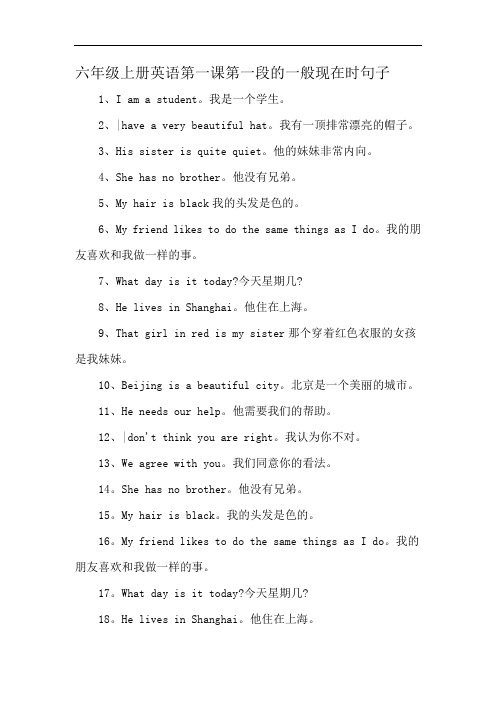
六年级上册英语第一课第一段的一般现在时句子1、I am a student。
我是一个学生。
2、|have a very beautiful hat。
我有一顶排常漂亮的帽子。
3、His sister is quite quiet。
他的妹妹非常内向。
4、She has no brother。
他没有兄弟。
5、My hair is black我的头发是色的。
6、My friend likes to do the same things as I do。
我的朋友喜欢和我做一样的事。
7、What day is it today?今天星期几?8、He lives in Shanghai。
他住在上海。
9、That girl in red is my sister那个穿着红色衣服的女孩是我妹妹。
10、Beijing is a beautiful city。
北京是一个美丽的城市。
11、He needs our help。
他需要我们的帮助。
12、|don't think you are right。
我认为你不对。
13、We agree with you。
我们同意你的看法。
14。
She has no brother。
他没有兄弟。
15。
My hair is black。
我的头发是色的。
16。
My friend likes to do the same things as I do。
我的朋友喜欢和我做一样的事。
17。
What day is it today?今天星期几?18。
He lives in Shanghai。
他住在上海。
19。
That girl in red is my sister。
那个穿着红色衣服的女孩是我妹妹。
一般现在时讲解及练习(含答案)

一般现在时讲解及练习(含答案)一、单项选择一般现在时1.If he ________ exercise, he______ healthy.A.not; will B.isn’t; won’t beC.doesn’t; will be D.doesn’t do; won’t be【答案】D【解析】【详解】考查if条件句中的时态。
句意:如果他不做运动,他就不会健康。
If条件句,如果主句用一般将来时态,则从句用一般现在时态,且句子主语是he,单数第三人称,故选D。
2.Whene ver you ______ a present, you’d better think about it from the receiver’s preference. A.bought B.buy C.will buy D.have bought【答案】B【解析】试题分析:句意:每当你买礼物的时候,你最好从接收方的偏好想一想。
whenever引导的让步状语从句,采用一般现在时表将来的用法。
故选B。
考点:考查动词的时态。
3.The Dragon Boat Festival ________ the beginning of the hottest season of the year.A.is marking B.marks C.will mark D.marked【答案】B【解析】试题分析:考查时态。
一般现在时表示经常性习惯性的行为。
本句中使用一般现在时端午节标志着一年中最热的季节的开始。
故B正确。
考点:考查时态4.That’s why I help brighten people’s days. If you ________, who’s to say that anothe r person will?A.didn’t B.don’tC.weren’t D.haven’t【答案】B【解析】【详解】考查条件状语从句中动词的时态。
英语一般现在时全面讲解(附练习及答案)
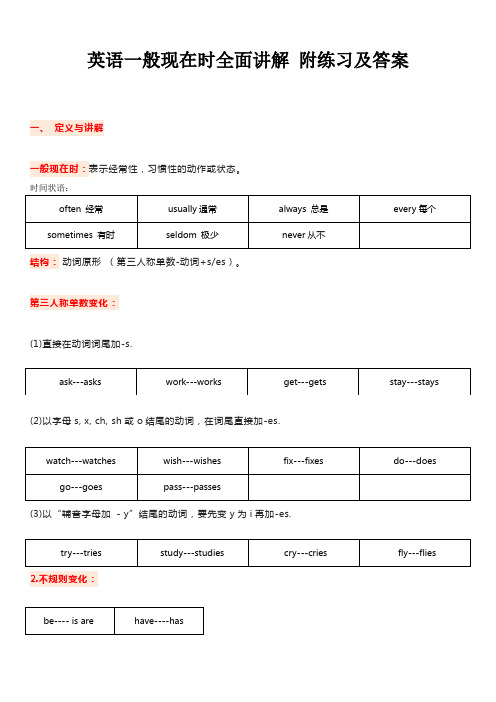
英语一般现在时全面讲解附练习及答案一、定义与讲解一般现在时:表示经常性,习惯性的动作或状态。
结构:动词原形(第三人称单数-动词+s/es)。
第三人称单数变化:(1)直接在动词词尾加-s.(2)以字母s, x, ch, sh或o结尾的动词,在词尾直接加-es.(3)以“辅音字母加- y”结尾的动词,要先变y为i再加-es.2.不规则变化:二、一般现在时用法1. 表示经常性,习惯性,永久性的动作或存在的状态.通常与副词sometimes, often, usually, always, every day (year, month ), once (twice, three times) a day,等时间状语连用。
2. 表示客观真理,科学原理,自然现象,等客观事实或格言,谚语等。
三、一般现在时的句子转换:(1)当句子中有be动词或情态动词时,则把be动词或情态动词(can,could等等)提到主语的前面变成疑问句;在be动词或情态动词后面加not变成否定句.(2)当句子中即没有be动词,也没有情态动词时,则在主语前加助动词do (you,以及复数), does(单数she,he,it)变成问句;在主语后谓语动词前加助动词don’t(I,you,以及复数), doesn’t(单数she,he,it)变成否定句,助动词后的动词要变成动词原形。
名师解析1.________ you often ________ tea?A.Do;drinks B.Does;drink C.Do;drink分析:你经常喝茶吗?根据often可知句子为一般现在时,主语为you,用助动词Do提问,动词用原形,C 符合题意,故选C。
2.My legs .A.hurt B.hurts C.hurting分析:我的腿……。
A痛,动词原形;B痛,动词单三形式,主语是名词复数,谓语动词用原形,排除;C痛,现在分词,用于现在进行时,构成be doing,缺少be,排除。
一般现在时练习(完整版)
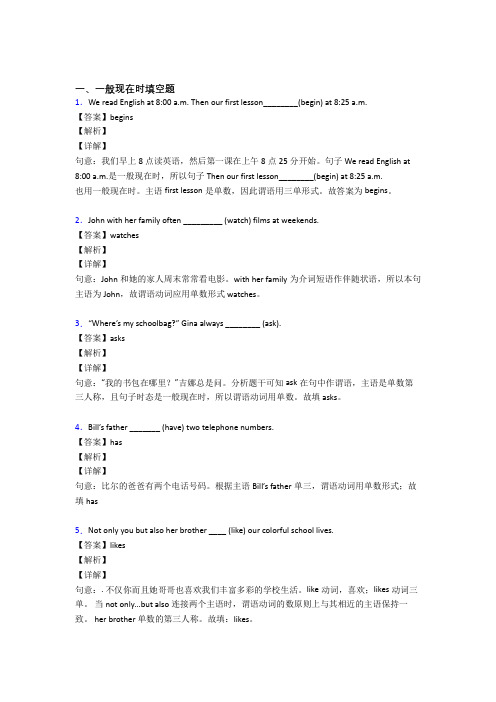
一、一般现在时填空题1.We read English at 8:00 a.m. Then our first lesson________(begin) at 8:25 a.m.【答案】begins【解析】【详解】句意:我们早上8点读英语,然后第一课在上午8点25分开始。
句子We read English at 8:00 a.m.是一般现在时,所以句子Then our first lesson________(begin) at 8:25 a.m.也用一般现在时。
主语first lesson是单数,因此谓语用三单形式。
故答案为begins。
2.John with her family often _________ (watch) films at weekends.【答案】watches【解析】【详解】句意:John和她的家人周末常常看电影。
with her family为介词短语作伴随状语,所以本句主语为John,故谓语动词应用单数形式watches。
3.“Where’s my schoolbag?” Gina always ________ (ask).【答案】asks【解析】【详解】句意:“我的书包在哪里?”吉娜总是问。
分析题干可知ask在句中作谓语,主语是单数第三人称,且句子时态是一般现在时,所以谓语动词用单数。
故填asks。
4.Bill’s father _______ (have) two telephone numbers.【答案】has【解析】【详解】句意:比尔的爸爸有两个电话号码。
根据主语Bill’s father单三,谓语动词用单数形式;故填has5.Not only you but also her brother ____ (like) our colorful school lives.【答案】likes【解析】【详解】句意:. 不仅你而且她哥哥也喜欢我们丰富多彩的学校生活。
(完整版)一般现在时的讲解及练习题
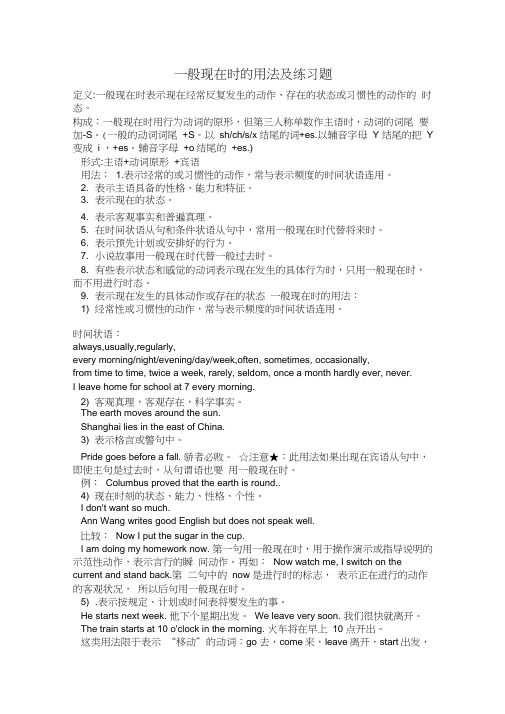
一般现在时的用法及练习题定义:一般现在时表示现在经常反复发生的动作、存在的状态或习惯性的动作的时态。
构成:一般现在时用行为动词的原形,但第三人称单数作主语时,动词的词尾要加-S。
(一般的动词词尾+S。
以sh/ch/s/x结尾的词+es.以辅音字母Y 结尾的把Y 变成i ,+es。
辅音字母+o结尾的+es.)形式:主语+动词原形+宾语用法: 1.表示经常的或习惯性的动作,常与表示频度的时间状语连用。
2. 表示主语具备的性格、能力和特征。
3. 表示现在的状态。
4. 表示客观事实和普遍真理。
5. 在时间状语从句和条件状语从句中,常用一般现在时代替将来时。
6. 表示预先计划或安排好的行为。
7. 小说故事用一般现在时代替一般过去时。
8. 有些表示状态和感觉的动词表示现在发生的具体行为时,只用一般现在时,而不用进行时态。
9. 表示现在发生的具体动作或存在的状态一般现在时的用法:1) 经常性或习惯性的动作,常与表示频度的时间状语连用。
时间状语:always,usually,regularly,every morning/night/evening/day/week,often, sometimes, occasionally,from time to time, twice a week, rarely, seldom, once a month hardly ever, never.I leave home for school at 7 every morning.2) 客观真理,客观存在,科学事实。
The earth moves around the sun.Shanghai lies in the east of China.3) 表示格言或警句中。
Pride goes before a fall. 骄者必败。
☆注意★:此用法如果出现在宾语从句中,即使主句是过去时,从句谓语也要用一般现在时。
例:Columbus proved that the earth is round..4) 现在时刻的状态、能力、性格、个性。
初中英语主要时态系列一——一般现在时讲解及练习

一般现在时有两层意思:(其一)就是表示经常性和习惯性的动作或状态;(其二)表示客观事实、自然现象。
一般现在时是英语动词的主要用法之一,因此,我们有必要掌握好它。
结合2019年的中考题分析,供大家为2020年中考作准备。
来和一、一般现在时有三种形式1. 谓语是be(am/is/are)的一般现在时。
①肯定形式:主语+be+表语(形容词、名词充当表语)。
I am hungry.You are beautiful.He is a doctor.②否定形式:主语+be+not+表语(形容词、名词充当表语)。
I am not hungry.You aren't beautiful.He isn't a doctor.③一般疑问句形式:Be+主语+表语(形容词、名词充当表语)?肯定回答:Yes,主语+be. 否定回答:No, 主语+ be+not.—Are you hungry?—Yes,I am./No,I'm not.—Is he a doctor?—Yes, he is./No, he isn,t.④特殊疑问句形式:特殊疑问词+Be开头的一般疑问句?—What is he?—He is a doctor.注意:be要随着主语变。
2. 谓语动词是实义动词(及物动词或不及物动词)的一般现在时。
①肯定形式:“主语+及物动词+宾语”或“主语+不及物动词”。
She has a little brother.她有一个弟弟。
The sun rises in the east.太阳从东方升起。
②否定形式:“主语+don't/doesn't+及物动词+宾语”或“主语+don't/doesn't+不及物动词”。
She doesn't have a little brother.她没有弟弟。
I don't eat every morning.我每天早晨都不吃饭。
小学英语语法一般现在时(包括练习)

语法专题一般现在时专项练习题1.概念:一般现在时表示经常的、习惯性的动作或存在的状态一般现在时表示现在经常反复发生的动作、存在的状态或习惯性的动作的时态。
可概括为①经常性或习惯性动作;②长期存在的特征或状态;③普遍真理、客观事实等。
2.构成:一般现在时的构成主要有两种形式,一般现在时用行为动词的原形,但第三人称单数作主语时,动词的词尾要加-S。
:(1)be型:句子的谓语动词只有be(am,is或are):a.肯定句中,只出现be,如:I am a student.我是一名学生。
b.否定句中,要在be后面加not,如:She isn't a teacher.她不是教师。
c.一般疑问句,要将be放在句子开头(注意句首字母大写),句尾用问号,答语用Yes,主语+be.或No,主语+be+not.如:—Are you ready?—你准备好了吗?—Yes,I am.—是的,我准备好了。
(—No,I'm not.—不,我没准备好。
)(2)实义动词型:句中的谓语动词为实义动词(也叫行为动词):a.肯定句中,只出现实义动词,如:I get up in the morning.我早晨起床。
b.否定句中,要在实义动词前面加do(does)+not,do(does)作助动词,本身无意义,常与not缩写成don't(doesn't),如:I don't like vegetables.我不喜欢蔬菜。
c.一般疑问句,要在句子开头借助动词Do(does),句尾用问号,简略答语用Yes,主语+do(does).或No,主语+do(does)+not.如:—Do you like oranges?—你喜欢桔子吗?—Yes,I do.—是的,我喜欢。
(—No,I don't.—不,我不喜欢。
)3.一般现在时的用法1)经常性或习惯性的动作,常与表示频腮度的时间状语连用。
时间状语:every…, sometimes, at…, on SundayI leave home for school at 7 every morning.2) 现在时刻的状态、能力、性格、个性。
英语语法速学(一般现在时)

2012年寒假《英语语法速学》
各位同学家长:
2012年寒假期间的学习时间初步定为1月14日-1月20日;1月30日-2月10;(即腊月二十一日至腊月二十七日;正月初八至正月十九日)共约20天左右。
我们的目标是帮助同学们把基本的语法内容全面梳理一遍;速记单词约2000左右;复习巩固新概念英语单词和课文。
下面是动词一般现在时的各种句型第一课练习题。
一般现在时的基本句型如下:
肯定句:主语(单数)+动词(加s/es)
主语(复数)+动词(原形)
否定句:主语(单数)+does not +动词(原形)
主语(复数)+do not +动词(原形)
疑问句:Does +主语(单数)+动词(原形)?
Do +主语(复数)+动词(原形)?
总结:肯定句中动词有变化,否定、疑问句中动词用原形,但助动词有单复数的区别。
- 1、下载文档前请自行甄别文档内容的完整性,平台不提供额外的编辑、内容补充、找答案等附加服务。
- 2、"仅部分预览"的文档,不可在线预览部分如存在完整性等问题,可反馈申请退款(可完整预览的文档不适用该条件!)。
- 3、如文档侵犯您的权益,请联系客服反馈,我们会尽快为您处理(人工客服工作时间:9:00-18:30)。
语法1一般现在时练习(第一课)一般现在时练习一、写出下列动词的第三人称单数talk______forget______hope______stop______perform______play______say______ buy______worry______fly______study_______like_______make______take______ love_______recite_______become_______come_______drive_______shine_______ leave_____wake_______ride_______write_______hike______give______see______ swim______stop______shop_______plan______get_______sit_______let_______ cut_______run_______forget_______begin_______wash_____watch_______finish______teach_____fish_______reach_______go_______do_____二、用括号内动词的适当形式填空。
1. He often ________(have) dinner at home.2. Daniel and Tommy _______(be) in Class One.3. We _______(not watch) TV on Monday.4. Nick _______(not go) to the zoo on Sunday.5. ______ they ________(like) the World Cup?6. What _______they often _______(do) on Saturdays?7. _______ your parents _______(read) newspapers every day?8. The girl _______(teach) us English on Sundays.9. She and I ________(take) a walk together every evening.10. There ________(be) some water in the bottle.11. Mike _______(like) cooking.12. They _______(have) the same hobby.13. My aunt _______(look) after her baby carefully.14. You always _______(do) your homework well.15. I _______(be) ill. I’m staying in bed.16. She _______(go) to school from Monday to Friday.17. Liu Tao _______(do) not like PE.18. The child often _______(watch) TV in the evening.19. Su Hai and Su Yang _______(have) eight lessons this term.20. -What day _______(be) it today? -It’s Saturday.21 We often ___________ (play) in the playground.22. He _________ (get) up at six o'clock.23. ________ you __________ (brush) your teeth every morning?24. What ________(do) he usually ________ (do) after school?25. Danny ____________ (study) English, Chinese, math, science and art at school.26. Mike sometimes __________ (go) to the park with his sister.27. At eight at night, she ____________ (watch) TV with her parents.28. ________ Mike _________ (read) English every day?29. How many lessons _________ your classmate _________ (have) on Monday?30.What time _________ his mother _________ (do) the housework?三、按照要求改写句子1. Daniel watches TV every evening.(改为否定句)_________________________2. I do my homework every day.(改为一般疑问句,并作否定回答)________________________________________________________3. She likes milk.(改为一般疑问句,并作肯定回答)___________________________4. Amy likes playing computer games.(改为一般疑问句,并作否定回答)___________________________________________________5. We go to school every morning.(改为否定句)____________________________6. He speaks English very well.(改为否定句)________________________7. I like taking photos in the park.(对划线部分提问)__________________________8. John comes from Canada.(对划线部分提问)____________________________9. She is always a good student.(改为一般疑问句,作否定回答)________________________________________________________10. Simon and Daniel like going skating.(改为否定句)________________________________________________________11. Do you often play football after school? (肯定回答) _______________12. I have many books. (改为否定句)_____________________13. Gao Shan's sister likes playing table tennis.(改为否定句)_________________14. She lives in a small town near New York.(改为一般疑问句)_________________15. I watch TV every day.(改为一般疑问句)___________________________16. David has got a goal. (改为一般疑问句)________________17.We have four lessons.(改为否定句)________________18. Nancy doesn't run fast. (改为肯定句)_________________________19. My dog runs fast. 否定句:______________一般疑问句:________________20. Mike has two letters for him.一般疑问句:_______________ 否定句:____________________ 21. I usually play football on Friday afternoon.否定句: ________________ 一般疑问句: _____________划线提问____________________22. Sun Yang usually washes some clothes on Saturday.否定句: _____________ 一般疑问句: ________________划线提问: ____________23. Mingming usually waters the flowers every day.否定句: ________________ 一般疑问句: _____________划线提问_____________ 24. Tom does his homework at home.否定句: ______________ 一般疑问句: ____________划线提问_____________四.用be动词的适当形式填空。
1. I______ a student . You______ a teacher .2. She _____ my friend.3. _____ you Li Fen ? No,______ not .4. Mr. green _____ very busy?Yes , he _____.5. He must _____ at home .6. Comedy ______ very interesting .7. ______ thrillers very scary ?8. You and I ____ good friends .9. His friends _____ very funny10. The twins _____ very happy because they want to go to a movie .11. The girl in red clothes _____ my sister .五、改错(划出错误的地方,将正确的写在横线上)1. Is your brother speak English? __________________2. Does he likes going fishing? __________________3. He likes play games after class. __________________4. Mr. Wu teachs us English. __________________5. She don’t do her homework on Sundays. _________________六、单选1 Jenny ____ in an office. Her parents ____in a hospital.A work; worksB works; workC work; are workingD is working; work2 One of the boys_____ a black hat.A haveB there isC there areD has3 We will go shopping if it____ tomorrow.A don't rain Bdidn't rain Cdoesn't rain Disn't rain4 He said the sun ____in the east and ____in the west.A rose; setB rises; setsC rises, setD rise; sets5 Wang Mei ____ music and often ____ to music.A like; listenB likes; listensC like; are listeningD liking ; listen6 Jenny____ English every evening.A has studyB studiesC studyD studied七、完形填空Jim Green is an announcer(播音员)for the program.Most of the girls___1____ boys like the program. They ___2___like Jim Green. Some of them often make phone calls to him and thank him ___3___ his work. There are lots of ___4___ to him every day,too.Jim Green gets up at 6:00 every morning.He has bread and a glass of milk ___5___ breakfast. He leaves home at 6:30 and ___6___ his office at 7:15.The program ___7____ at 7:30.He plays the new records (唱片)of the pop songs and modern music for his listeners. At 8:00 it's time ____8____ the news.Jim finishes work at 10:30. He goes home ____9____ his car.He ___10___ newspaper and listens to music after supper.He thinks his life is very interesting.( )1.A and B with C but D about ( )2.A too B to C also D so( )3.A to B for C fo D and ( )4.A letter B letters C friends D words( )5.A at B with C for D to ( )6.A goes B gets C gets to D gets up( )7.A begins B finishes C over D start ( )8.A to B for C of D in( )9.A by B in C on D takes ( )10.A looks B reads C sees D watches八、作文根据实际情况,以My School Day为题写一篇作文,字数在60左右。
